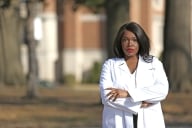You have /5 articles left.
Sign up for a free account or log in.
Lynn Pasquerella, president of the Association of American Colleges and Universities, weighed in on the ongoing debate over campus free speech Tuesday in a statement called “Free Expression, Liberal Education and Inclusive Excellence.” While other statements on the issue have admonished student protesters who would limit free -- if controversial -- speech in the interest of diversity and inclusion, Pasquerella was more considerate of such students’ concerns.
“Like those who blocked recruiters from campuses during the Vietnam War, these protesters regard their actions as justified on the grounds of necessity and attempts to stop them as further silencing those representing the most vulnerable members of society,” she said. Noting that AAC&U has long supported academic freedom but also has expanded its mission to “recognize the inextricable link between equity and quality in liberal education,” Pasquerella asserted that “a commitment to inclusivity, as well as respect for others and free inquiry, must be paramount in maintaining an environment in which the free exchange of ideas can thrive and in guiding the determination of whether speech is protected under academic freedom.”
Institutions of higher learning have different missions but are all united by “the shared goals of educating students and advancing knowledge,” and there are “circumstances under which the achievement of both objectives entails restrictions on free expression,” the statements says. Too often, it continues, free speech and academic freedom are conflated in debates surrounding campus speech. “While all views have equal standing in the public square under the First Amendment, this is not the case in the classroom,” and professors at public and private college and universities “can mandate respectful dialogue by proscribing certain types of language and other forms of expression and can stipulate rules for being recognized in a discussion.”
Pasquerella said liberal education “is designed to develop students’ capacities to think critically and to make themselves vulnerable to criticism by welcoming dissenting voices.” And in preparing students for the future, she added, “faculty members should offer curricula that include a diversity of intellectual perspectives appropriate to their disciplines, and they must also be aware of the extent to which their positionality, framing of issues and syllabi, together with written policies, campus cultures and comments by other members of the community, can serve as inhibitors of speech.”









